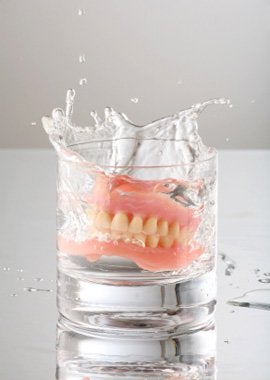Glenview Dentures

Dentures are removable appliances that can replace some or all missing teeth. Dentures are used to help restore your smile as well as chewing functions. If you’ve lost all or some your natural teeth, whether from gum disease, tooth decay or injury, replacing missing teeth will benefit your appearance and your health. That’s because dentures make it easier to eat and speak better than you could without teeth—things that people often take for granted.
When you lose all of your teeth, facial muscles can sag, making you look older. Dentures can help fill out the appearance of your face and profile. They can be made to closely resemble your natural teeth so that your appearance does not change much. Dentures may even improve the look of your smile.
Types of Dentures:
Partial Denture: This partial removeable denture is for patients missing only some of their teeth. This can be made out of cast metal or valplast [plastic] material. The partial dentures can also be used as a temporary prosthesis before implant or bridge placement.
Conventional: This full removable denture is made and placed in your mouth after the remaining teeth are removed and tissues have healed, which may take several months.
Immediate: This removable denture is inserted on the same day that the remaining teeth are removed. Before the removal of remaining teeth, we will take measurements and make models of your jaw during a preliminary visit. You don’t have to be without teeth during the healing period, but may need to have the denture relined or remade after your jaw has healed to ensure ideal fit.
*** Implant Overdenture ***: This is the gold standard in denture treamtent. Implants are placed in the bone to help support the denture.
New dentures may feel awkward for a few weeks until you become accustomed to them. The dentures may feel loose while the muscles of your cheek and tongue learn to keep them in place. It is not unusual to experience minor irritation or soreness. You may find that saliva flow temporarily increases. As your mouth becomes accustomed to the dentures, these problems should go away. Typically, few follow-up appointments are generally needed after a denture is inserted so the fit can be checked and adjusted.
Even if you wear full dentures, you still have to maintain good oral hygiene. Brush your gums, tongue and roof of your mouth every morning with a soft-bristled brush before you insert your dentures to stimulate circulation in your tissues and help remove plaque.
Typically denture wearers use adhesives. Adhesives come in many forms: creams, powders, pads/wafers, strips or liquids. If you use one of these products, read the instructions, and use them exactly as directed. We can recommend appropriate cleansers and adhesives.
